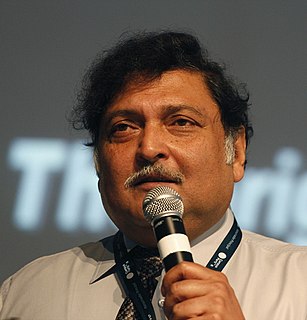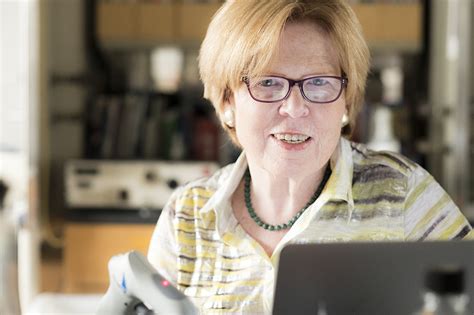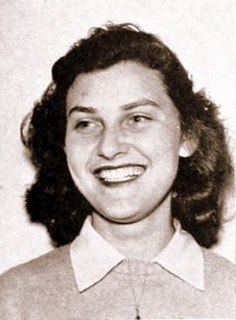A Quote by Maria Montessori
Supposing I said there was a planet without schools or teachers, where study was unknown, and yet the inhabitants -- doing nothing but live and walk about -- came to know all things, to carry in their minds the whole of learning; would you not think I was romancing? Well, just this, which seems so fanciful as to be nothing but the invention of a fertile imagination, is a reality. It is the child's way of learning.
Related Quotes
If I had lost a leg, I would tell them, instead of a boy, no one would ever ask me if I was 'over it'. They would ask me how I was doing learning to walk without my leg. I was learning to walk and to breathe and to live without Wade. And what I was learning is that it was never going to be the life I had before.
And do you know, do you know that mankind can live without the Englishman, it can live without Germany, it can live only too well without the Russian man, it can live without science, without bread, and it only cannot live without beauty, for then there would be nothing at all to do in the world! The whole secret is here, the whole of history is here. Science itself would not stand for a minute without beauty
Just supposing," he said, "just supposing" --he didn't know what was coming next, so he thought he'd just sit back and listen--"that there was some extraordinary way in which you were very important to me, and that, though you didn't know it, I was very important to you, but it all went for nothing because we only had five miles and I was a stupid idiot at knowing how to say something very important to someone I've only just met and not crash into lorries a the same time, what would you say..." He paused, helplessly, and looked at her. "I should do.
Will robot teachers replace human teachers? No, but they can complement them. Moreover, the could be sufficient in situations where there is no alternative––to enable learning while traveling, or while in remote locations, or when one wishes to study a topic for which there is not easy access to teachers. Robot teachers will help make lifelong learning a practicality. They can make it possible to learn no matter where one is in the world, no matter the time of day. Learning should take place when it is needed, when the learner is interested, not according to some arbitrary, fixed schedule
Learning to read and write makes little sense if you don't understand what you're reading and writing about. While we may have forgotten, most of our early learning came not from being explicitly taught but from experiencing. Kids aren't born knowing hard and soft, sweet and sour, red and green. When the child experiences those things, s/he transforms them into psychological understandings. When kids play with other kids, they learn about others and about themselves. Learning the basics of our physical and social reality is what early childhood is all about.
Not being known doesn't stop the truth from being true. You are led through your lifetime by the inner learning creature, the playful spiritual being that is your real self. What the caterpillar calls the end of the world, the master calls a butterfly. Learning is finding out what we already know. Doing is demonstrating that you know it. Teaching is reminding others that they know just as well as you. You are all learners, doers and teachers. The best way to pay for a lovely moment is to enjoy it.
When he first started - Jim Henson, who created Bid Bird and Oscar - he said Big Bird was just a big, goofy guy. And it was - a script came along and I said, 'I think Big Bird would be much more useful to the show if he were a child learning all the things we were teaching in the show.' And so he didn't know the alphabet, even, for instance.
We absolutely must leave room for doubt or there is no progress and there is no learning. There is no learning without having to pose a question. And a question requires doubt. People search for certainty. But there is no certainty. People are terrified — how can you live and not know? It is not odd at all. You only think you know, as a matter of fact. And most of your actions are based on incomplete knowledge and you really don’t know what it is all about, or what the purpose of the world is, or know a great deal of other things. It is possible to live and not know.
The best schools tend to have the best teachers, not to mention parents who supervise homework, so there is less need for self-organised learning. But where a child comes from a less supportive home environment, where there are family tensions perhaps, their schoolwork can suffer. They need to be taught to think and study for themselves.
There is first the problem of acquiring content, which is learning. There is another problem of acquiring learning skills, which is not merely learning, but learning to learn, not velocity, but acceleration. Learning to learn is one of the great inventions of living things. It is tremendously important. It makes evolution, biological as well as social, go faster. And it involves the development of the individual.
Traditional education focuses on teaching, not learning. It incorrectly assumes that for every ounce of teaching there is an ounce of learning by those who are taught. However, most of what we learn before, during, and after attending schools is learned without its being taught to us. A child learns such fundamental things as how to walk, talk, eat, dress, and so on without being taught these things. Adults learn most of what they use at work or at leisure while at work or leisure. Most of what is taught in classroom settings is forgotten, and much or what is remembered is irrelevant.



































